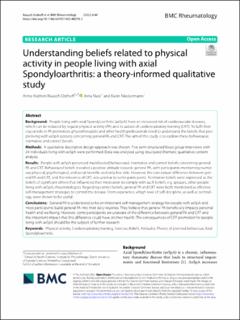Please use this identifier to cite or link to this item:
https://doi.org/10.21256/zhaw-25531Full metadata record
| DC Field | Value | Language |
|---|---|---|
| dc.contributor.author | Rausch Osthoff, Anne-Kathrin | - |
| dc.contributor.author | Nast, Irina | - |
| dc.contributor.author | Niedermann Schneider, Karin | - |
| dc.date.accessioned | 2022-08-29T09:58:58Z | - |
| dc.date.available | 2022-08-29T09:58:58Z | - |
| dc.date.issued | 2022-07-25 | - |
| dc.identifier.issn | 2520-1026 | de_CH |
| dc.identifier.uri | https://digitalcollection.zhaw.ch/handle/11475/25531 | - |
| dc.description.abstract | Background: People living with axial Spondyloarthrtis (axSpA) have an increased risk of cardiovascular diseases, which can be reduced by regular physical activity (PA) and its subset of cardiorespiratory training (CRT). To fulfil their crucial role in PA promotion, physiotherapists and other health professionals need to understand the beliefs that people living with axSpA possess concerning general PA and CRT. The aim of this study is to explore these behavioural, normative and control beliefs. Methods: A qualitative descriptive design approach was chosen. Five semi-structured focus group interviews with 24 individuals living with axSpA were performed. Data was analysed using structured thematic qualitative content analysis. Results: People with axSpA possessed multifaceted behavioural, normative and control beliefs concerning general PA and CRT. Behavioural beliefs revealed a positive attitude towards general PA, with participants mentioning numerous physical, psychological, and social benefits and only few risks. However, the conceptual difference between general PA and CRT, and the relevance of CRT, was unclear to some participants. Normative beliefs were expressed as the beliefs of significant others that influenced their motivation to comply with such beliefs, e.g. spouses, other people living with axSpA, rheumatologists. Regarding control beliefs, general PA and CRT were both mentioned as effective self-management strategies to control the disease. From experience, a high level of self-discipline, as well as technology, were shown to be useful. Conclusions: General PA is understood to be an important self-management strategy for people with axSpA and most participants build general PA into their daily routines. They believe that general PA beneficially impacts personal health and wellbeing. However, some participants are unaware of the difference between general PA and CRT and the important impact that this difference could have on their health. The consequences of CRT promotion for people living with axSpA should be the subject of further research. | de_CH |
| dc.language.iso | en | de_CH |
| dc.publisher | BioMed Central | de_CH |
| dc.relation.ispartof | BMC Rheumatology | de_CH |
| dc.rights | https://creativecommons.org/licenses/by/4.0/ | de_CH |
| dc.subject | Attitude | de_CH |
| dc.subject | Axial Spondyloarthritis | de_CH |
| dc.subject | Belief | de_CH |
| dc.subject | Cardiorespiratory training | de_CH |
| dc.subject | Exercise | de_CH |
| dc.subject | Physical activity | de_CH |
| dc.subject | Theory of planned behaviour | de_CH |
| dc.subject.ddc | 615.82: Physiotherapie | de_CH |
| dc.subject.ddc | 616.8: Neurologie und Krankheiten des Nervensystems | de_CH |
| dc.title | Understanding beliefs related to physical activity in people living with axial Spondyloarthritis : a theory-informed qualitative study | de_CH |
| dc.type | Beitrag in wissenschaftlicher Zeitschrift | de_CH |
| dcterms.type | Text | de_CH |
| zhaw.departement | Gesundheit | de_CH |
| zhaw.organisationalunit | Institut für Physiotherapie (IPT) | de_CH |
| dc.identifier.doi | 10.1186/s41927-022-00270-2 | de_CH |
| dc.identifier.doi | 10.21256/zhaw-25531 | - |
| dc.identifier.pmid | 35871641 | de_CH |
| zhaw.funding.eu | No | de_CH |
| zhaw.issue | 1 | de_CH |
| zhaw.originated.zhaw | Yes | de_CH |
| zhaw.pages.start | 40 | de_CH |
| zhaw.publication.status | publishedVersion | de_CH |
| zhaw.volume | 6 | de_CH |
| zhaw.publication.review | Peer review (Publikation) | de_CH |
| zhaw.author.additional | No | de_CH |
| zhaw.display.portrait | Yes | de_CH |
| zhaw.monitoring.costperiod | 2022 | de_CH |
| Appears in collections: | Publikationen Gesundheit | |
Files in This Item:
| File | Description | Size | Format | |
|---|---|---|---|---|
| 2022_Rausch-etal_Physical-activity-beliefs-people-with-axSpA.pdf | 986.68 kB | Adobe PDF |  View/Open |
Show simple item record
Rausch Osthoff, A.-K., Nast, I., & Niedermann Schneider, K. (2022). Understanding beliefs related to physical activity in people living with axial Spondyloarthritis : a theory-informed qualitative study. BMC Rheumatology, 6(1), 40. https://doi.org/10.1186/s41927-022-00270-2
Rausch Osthoff, A.-K., Nast, I. and Niedermann Schneider, K. (2022) ‘Understanding beliefs related to physical activity in people living with axial Spondyloarthritis : a theory-informed qualitative study’, BMC Rheumatology, 6(1), p. 40. Available at: https://doi.org/10.1186/s41927-022-00270-2.
A.-K. Rausch Osthoff, I. Nast, and K. Niedermann Schneider, “Understanding beliefs related to physical activity in people living with axial Spondyloarthritis : a theory-informed qualitative study,” BMC Rheumatology, vol. 6, no. 1, p. 40, Jul. 2022, doi: 10.1186/s41927-022-00270-2.
RAUSCH OSTHOFF, Anne-Kathrin, Irina NAST und Karin NIEDERMANN SCHNEIDER, 2022. Understanding beliefs related to physical activity in people living with axial Spondyloarthritis : a theory-informed qualitative study. BMC Rheumatology. 25 Juli 2022. Bd. 6, Nr. 1, S. 40. DOI 10.1186/s41927-022-00270-2
Rausch Osthoff, Anne-Kathrin, Irina Nast, and Karin Niedermann Schneider. 2022. “Understanding Beliefs Related to Physical Activity in People Living with Axial Spondyloarthritis : A Theory-Informed Qualitative Study.” BMC Rheumatology 6 (1): 40. https://doi.org/10.1186/s41927-022-00270-2.
Rausch Osthoff, Anne-Kathrin, et al. “Understanding Beliefs Related to Physical Activity in People Living with Axial Spondyloarthritis : A Theory-Informed Qualitative Study.” BMC Rheumatology, vol. 6, no. 1, July 2022, p. 40, https://doi.org/10.1186/s41927-022-00270-2.
Items in DSpace are protected by copyright, with all rights reserved, unless otherwise indicated.